高中英语 形容词与副词
- 格式:doc
- 大小:29.00 KB
- 文档页数:2
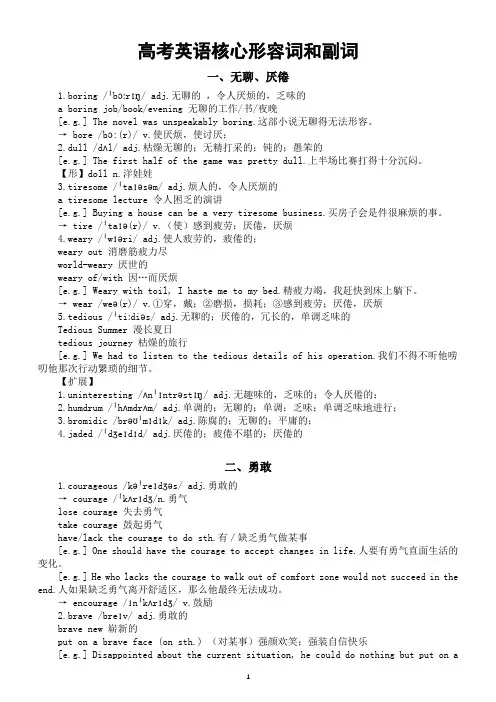
高考英语核心形容词和副词一、无聊、厌倦1.boring /ˈbɔːrɪŋ/ adj.无聊的,令人厌烦的,乏味的a boring job/book/evening 无聊的工作/书/夜晚[e.g.] The novel was unspeakably boring.这部小说无聊得无法形容。
→ bore /bɔ:(r)/ v.使厌烦,使讨厌;2.dull /dʌl/ adj.枯燥无聊的;无精打采的;钝的;愚笨的[e.g.] The first half of the game was pretty dull.上半场比赛打得十分沉闷。
【形】doll n.洋娃娃3.tiresome /ˈtaɪəsəm/ adj.烦人的,令人厌烦的a tiresome lecture 令人困乏的演讲[e.g.] Buying a house can be a very tiresome business.买房子会是件很麻烦的事。
→ tire /ˈtaɪə(r)/ v.(使)感到疲劳;厌倦,厌烦4.weary /ˈwɪəri/ adj.使人疲劳的,疲倦的;weary out 消磨筋疲力尽world-weary 厌世的weary of/with 因…而厌烦[e.g.] Weary with toil, I haste me to my bed.精疲力竭,我赶快到床上躺下。
→ wear /weə(r)/ v.①穿,戴;②磨损,损耗;③感到疲劳;厌倦,厌烦5.tedious /ˈtiːdiəs/ adj.无聊的;厌倦的,冗长的,单调乏味的Tedious Summer 漫长夏日tedious journey 枯燥的旅行[e.g.] We had to listen to the tedious details of his operation.我们不得不听他唠叨他那次行动繁琐的细节。
【扩展】1.uninteresting /ʌnˈɪntrəstɪŋ/ adj.无趣味的,乏味的;令人厌倦的;2.humdrum /ˈhʌmdrʌm/ adj.单调的;无聊的;单调;乏味;单调乏味地进行;3.bromidic /brəʊˈmɪdɪk/ adj.陈腐的;无聊的;平庸的;4.jaded /ˈdʒeɪdɪd/ adj.厌倦的;疲倦不堪的;厌倦的二、勇敢1.courageous /kəˈreɪdʒəs/ adj.勇敢的→ courage /ˈkʌrɪdʒ/n.勇气lose courage 失去勇气take courage 鼓起勇气have/lack the courage to do sth.有/缺乏勇气做某事[e.g.] One should have the courage to accept changes in life.人要有勇气直面生活的变化。
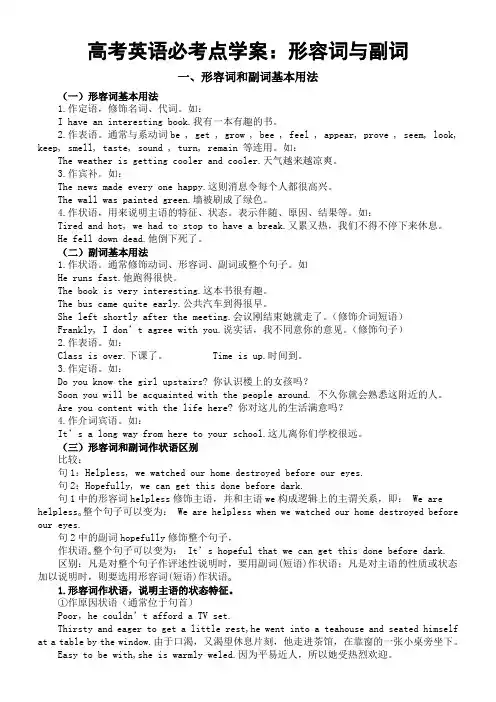
高考英语必考点学案:形容词与副词一、形容词和副词基本用法(一)形容词基本用法1.作定语,修饰名词、代词。
如:I have an interesting book.我有一本有趣的书。
2.作表语。
通常与系动词be , get , grow , bee , feel , appear, prove , seem, look, keep, smell, taste, sound , turn, remain 等连用。
如:The weather is getting cooler and cooler.天气越来越凉爽。
3.作宾补。
如:The news made every one happy.这则消息令每个人都很高兴。
The wall was painted green.墙被刷成了绿色。
4.作状语,用来说明主语的特征、状态。
表示伴随、原因、结果等。
如:Tired and hot, we had to stop to have a break.又累又热,我们不得不停下来休息。
He fell down dead.他倒下死了。
(二)副词基本用法1.作状语。
通常修饰动词、形容词、副词或整个句子。
如He runs fast.他跑得很快。
The book is very interesting.这本书很有趣。
The bus came quite early.公共汽车到得很早。
She left shortly after the meeting.会议刚结束她就走了。
(修饰介词短语)Frankly, I don’t agree with you.说实话,我不同意你的意见。
(修饰句子)2.作表语。
如:Class is over.下课了。
Time is up.时间到。
3.作定语。
如:Do you know the girl upstairs? 你认识楼上的女孩吗?Soon you will be acquainted with the people around. 不久你就会熟悉这附近的人。
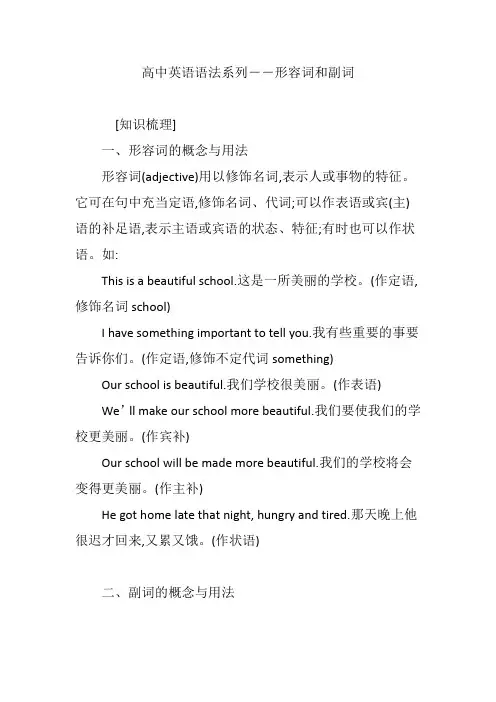
高中英语语法系列――形容词和副词[知识梳理]一、形容词的概念与用法形容词(adjective)用以修饰名词,表示人或事物的特征。
它可在句中充当定语,修饰名词、代词;可以作表语或宾(主)语的补足语,表示主语或宾语的状态、特征;有时也可以作状语。
如:This is a beautiful school.这是一所美丽的学校。
(作定语,修饰名词school)I have something important to tell you.我有些重要的事要告诉你们。
(作定语,修饰不定代词something)Our school is beautiful.我们学校很美丽。
(作表语)We’ll make our school more beautiful.我们要使我们的学校更美丽。
(作宾补)Our school will be made more beautiful.我们的学校将会变得更美丽。
(作主补)He got home late that night, hungry and tired.那天晚上他很迟才回来,又累又饿。
(作状语)二、副词的概念与用法副词(adverb)用以修饰动词、形容词或其它副词。
它在句中主要作状语,个别副词也可作表语、定语、或宾(主)语补足语。
He studies hard.他学习很努力。
(作状语,修饰动词)I’m terribly sorry for being late. 非常抱歉,我迟到了。
(作状语,修饰形容词)This coat fits him very well.这件上衣他穿着很合适。
(作状语,修饰副词)The people here are kind to us.这里的人对我们很好。
(作定语,修饰The people)When will you be back? 你什么时候回来?(作表语)三、形容词与副词的转换有的形容词加上ly后可转换成副词,规则如下:注意:friendly, motherly, lovely等词虽然以ly结尾,但不是副词,而是形容词。
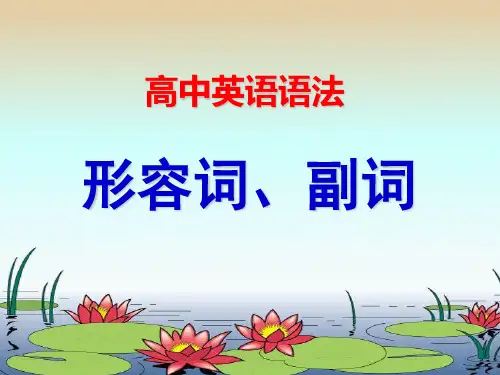
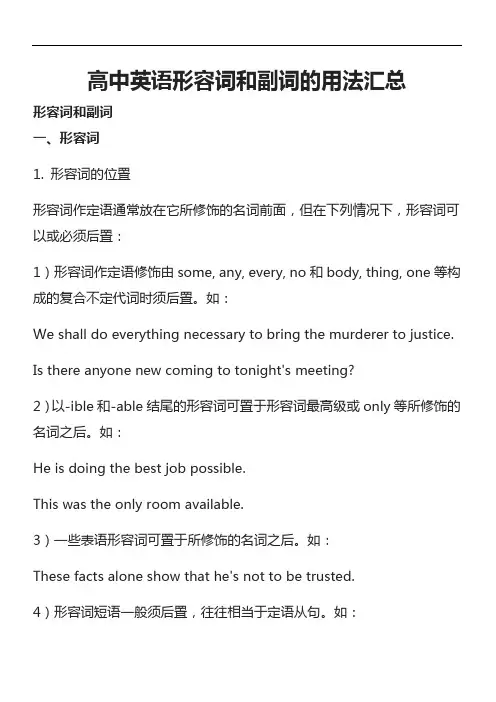
高中英语形容词和副词的用法汇总形容词和副词一、形容词1. 形容词的位置形容词作定语通常放在它所修饰的名词前面,但在下列情况下,形容词可以或必须后置:1)形容词作定语修饰由some, any, every, no和body, thing, one等构成的复合不定代词时须后置。
如:We shall do everything necessary to bring the murderer to justice.Is there anyone new coming to tonight's meeting?2)以-ible和-able结尾的形容词可置于形容词最高级或only等所修饰的名词之后。
如:He is doing the best job possible.This was the only room available.3)一些表语形容词可置于所修饰的名词之后。
如:These facts alone show that he's not to be trusted.4)形容词短语一般须后置,往往相当于定语从句。
如:He was a king anxious for his people's welfare.2. 前置形容词的排列顺序多个形容词修饰名词时,它们的顺序大致为:描绘性形容词(短词在前,长词在后)→表特征的形容词(包括大小、形状、新旧、年龄等,顺序也大致如此,但不固定)→表颜色的形容词→表类属的形容词(包括专有形容词和表材料质地的形容词)。
如:the beautiful little white Chinese bridgea tall intelligent young British officer二、副词1. 副词的分类副词大体上可分为下面几类:1)时间副词,如before, early, now。
2)地点副词,如everywhere, there, here。

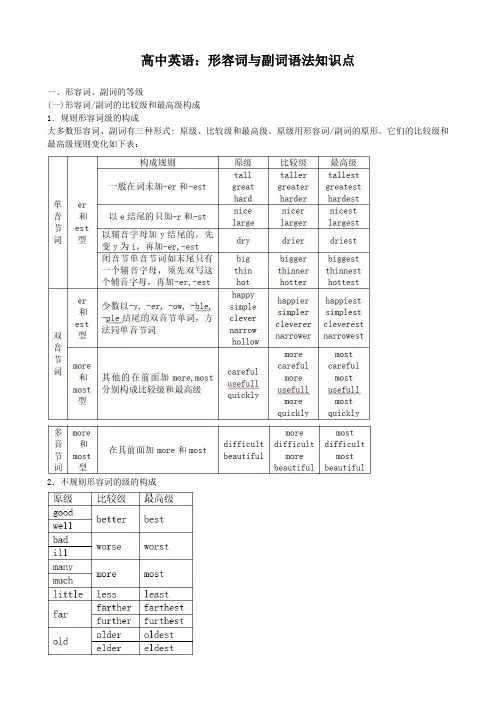
高中英语:形容词与副词语法知识点一、形容词、副词的等级(一)形容词/副词的比较级和最高级构成1.规则形容词级的构成大多数形容词、副词有三种形式: 原级、比较级和最高级。
原级用形容词/副词的原形。
它们的比较级和最高级规则变化如下表:2.不规则形容词的级的构成3.形容词、副词递减的比较等级的构成在形容词、副词前加less和least,表示“较不”和“最不”interesting有趣的 less interesting较无趣的 least interesting最无趣的important重要的 less important较不重要的 least important最不重要的有些形容詞可以加er及est或前面加上more / most來形成比較級和最高級polite –politer 或more polite –politest 或most polite ,这类词还有quiet,handsome,pleasant,common,exact.注意:下列双音节词比较级和最高级加er;est(1).无规律,死记住的词cruel,pleasant quiet civil exact stupid commom,dismal(阴沉的,忧郁的), devine(梦幻的) antique(古老的) grotesque(怪诞的)(2)-le以le为结尾的词idle,feeble, senile(衰老的), agile(灵巧的), nimble(灵活的,敏捷的). Humble(谦虚的,简陋的). Suble(阴暗的,貂皮的), able. Supple(柔顺的,灵活的).gentle.noble.. (3)-y以y为结尾的词lucky happy misty stormy,kingly, naughty, angry timely lively,healthy, heavy,busy,beastly...heavy,busy(4)重音在第二音节上chinese remote afraid alone alike apart polite severe intense obscureprofound(5)-er以ER为结尾的词tender sober clever bitter(6)-owyellow narrow shallow(浅的,表面的) hollow4.没有比较级和最高级的形容词、副词有些形容词由于其本身涵义一般不用来比较。

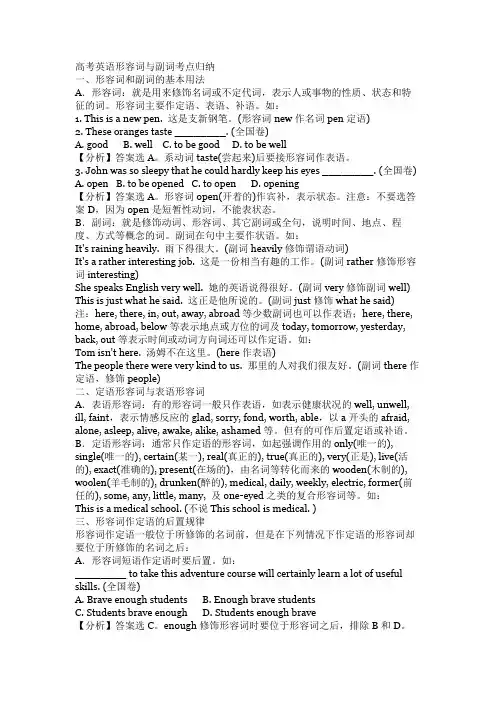
高考英语形容词与副词考点归纳一、形容词和副词的基本用法A.形容词:就是用来修饰名词或不定代词,表示人或事物的性质、状态和特征的词。
形容词主要作定语、表语、补语。
如:1. This is a new pen. 这是支新钢笔。
(形容词new作名词pen定语)2. These oranges taste ________. (全国卷)A. goodB. wellC. to be goodD. to be well【分析】答案选A。
系动词taste(尝起来)后要接形容词作表语。
3. John was so sleepy that he could hardly keep his eyes ________. (全国卷)A. openB. to be openedC. to openD. opening【分析】答案选A。
形容词open(开着的)作宾补,表示状态。
注意:不要选答案D,因为open是短暂性动词,不能表状态。
B.副词:就是修饰动词、形容词、其它副词或全句,说明时间、地点、程度、方式等概念的词。
副词在句中主要作状语。
如:It's raining heavily. 雨下得很大。
(副词heavily修饰谓语动词)It's a rather interesting job. 这是一份相当有趣的工作。
(副词rather修饰形容词interesting)She speaks English very well. 她的英语说得很好。
(副词very修饰副词well) This is just what he said. 这正是他所说的。
(副词just修饰what he said)注:here, there, in, out, away, abroad等少数副词也可以作表语;here, there, home, abroad, below等表示地点或方位的词及today, tomorrow, yesterday, back, out等表示时间或动词方向词还可以作定语。

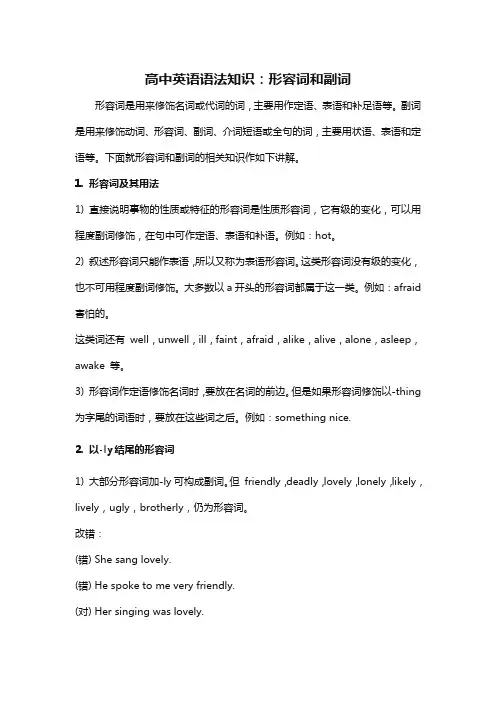
高中英语语法知识:形容词和副词形容词是用来修饰名词或代词的词,主要用作定语、表语和补足语等。
副词是用来修饰动词、形容词、副词、介词短语或全句的词,主要用状语、表语和定语等。
下面就形容词和副词的相关知识作如下讲解。
1. 形容词及其用法1) 直接说明事物的性质或特征的形容词是性质形容词,它有级的变化,可以用程度副词修饰,在句中可作定语、表语和补语。
例如:hot。
2) 叙述形容词只能作表语,所以又称为表语形容词。
这类形容词没有级的变化,也不可用程度副词修饰。
大多数以a开头的形容词都属于这一类。
例如:afraid 害怕的。
这类词还有well,unwell,ill,faint,afraid,alike,alive,alone,asleep,awake 等。
3) 形容词作定语修饰名词时,要放在名词的前边。
但是如果形容词修饰以-thing 为字尾的词语时,要放在这些词之后。
例如:something nice.2. 以-ly结尾的形容词1) 大部分形容词加-ly可构成副词。
但friendly,deadly,lovely,lonely,likely,lively,ugly,brotherly,仍为形容词。
改错:(错) She sang lovely.(错) He spoke to me very friendly.(对) Her singing was lovely.(对) He spoke to me in a very friendly way.2) 有些以-ly 结尾既为形容词,也为副词,如daily,weekly,monthly,yearly,early等。
例如:The Times is a weekly paper. 《时代周刊》为周刊。
The Times is published weekly. 《时代周刊》每周发行一期。
3. 用形容词表示类别和整体1) 某些形容词加上定冠词可以泛指一类人,与谓语动词的复数连接,如the dead,the living,the rich,the poor,the blind,the hungry等。
高考英语语法复习
形容词与副词知识讲解
一、形容词的用法
被形容词修饰的名词若还有其他词修饰,如冠词、指示代词、形容词性物主代词等,这些词要置于形容词前。
名词前的多个修饰语可用
“限定描绘大长高,
形状年龄和新老,
颜色国籍出材料,
作用类别往后靠”
来记忆。
二、易用错的几类形容词
三、形容词的比较等级
English is as interesting a subject as Chinese.
Which is the better of the two watches?
She is the taller of the two girls.
other或else把主语排除在比较对象之外;但如果不在同一范围比较则不需要用。
Susan is taller than any girl in her sister’s class.
四、副词的句法功能
五、副词的位置
六、副词比较等级的用法。
高考英语形容词与副词一、形容词01 形容词的句法功能02 形容词的位置形容词作定语时一般置于被修饰词前作前置定语,下列情况中形容词通常后置于被修饰词。
(1)修饰something,anybody,nobody,anything等复合不定代词时There is nothing wrong with the machine.(机器什么问题都没有。
)(2)形容词词组作定语时She bought a book suitable for children.(她买了本适合孩子们的图书。
)(3)修饰表示数量的词要后置The baby is only five months old.(这个婴儿仅有五个月大。
)(4)enough作形容词修饰名词时,一般放在名词之前,也可放在名词之后We don't bring enough money.(我们没带够钱。
)There‘ll be time enough to relax when you’ve finished your work.(你完成工作后会有足够的时间来放松。
)[注]形容词常见于定语位置和表语位置,以上只列出几种常见情况讲解。
具体位置要视具体形容词及句子而定。
03 多个形容词修饰名词时的语序按以下顺序排列:(1)限定词(a/an,the,this,his,first,one...)(2)表示特征或性质等描述性形容词(good,pretty...)(3)表示大小、长短、高低的形容词(big,long,little...)(4)表示形状的形容词(round,square...)(5)表示年龄、新旧的形容词(old,young,new...)(6)表示颜色的形容词(red,yellow...)(7)表示国籍、地区、出处的形容词(America,southern,Italian...)(8)表示物质材料的形容词(wooden,woollen,glass...)(9)表示用途、类别的形容词(medical,writing...)a beautiful large green Chinese carpet一块漂亮宽大的绿色的中国地毯the first three days 头三天enormous black iron gates 巨大的黑色铁门04 形容词的特殊用法二、副词01 副词的种类根据词义可分为:(1)时间副词yesterday(昨天),today(今天),now(现在)等。
本文列举高中英语典型的同组形容词与副词共21组帮助同学们更高的辨析不同形容词、副词用法。
1.good,wellwell是副词,用来修饰动词,如i swim wellgood是形容词,修饰名词,如a good student另外i am well,这里的well专门用来修饰身体健康2.big,large,greatbig是使用最广的形容词,其反义词是small。
可以指范围、面积、体积、重量等方面,口语中较常用。
如:There is a big tree in front of the house. 房子前有一棵大树。
He is big enough to ride a bike. 他长大了,足可以骑自行车了。
Mr Wang works in a big factory. 王先生在一家大工厂工作。
large侧重于面积、体积、容积和数量等,比较正式,不常用来指人。
表示物时,可与big 通用。
如:Shanghai is one of the largest cities in China. 上海是中国最大的城市之一。
They have a large farm. 他们有一座大农场。
Our school is a large one. 我们的学校是一座大学校。
great 通常侧重于形容抽象化的东西,常带有主观色彩,也可以修饰人或物,用来指人时,表示“伟大的”、“杰出的”意思。
如:Our party is a great party. 我们的党是伟大的党。
China isa great country with a long history. 中国是一个具有悠久历史的伟大国家。
3.beautiful这组词均含有“美丽”、“漂亮”、“可爱”的意思。
beautiful指能不仅给人带来感官上的快乐,而且通过感官产生思想和灵魂的愉悦,在同类词中层次最She was even more beautiful than I had remembered.她比我记忆中的她更漂亮了。
第6讲形容词与副词■自主检测■Ⅰ.在空白处填入适当的内容(1个单词)或括号内单词的正确形式1.The salesman showed her several mobile phones and she chose__inexpensive______ (expensive) one as she didn't want to spend too much money on it.2.Instead of blaming the child who had broken the vase, she gave him a ___tolerated_____ (tolerate) smile and let him go.3.Be __reasonable______ (reason) — you can't expect me to finish all this work in so little time.4.Many people have donated that type of blood; however,the blood bank needs __more______ (much).5.Tony can hardly boil an egg, still __less______ (little) cook dinner.6.Those poor and needy teenagers were excited to find a shop at the corner where they could buy bikes at _affordable_______ (afford) prices.7.If we leave right away, _hoping_______ (hope) we'll arrive on time.8.I've been writing this report _occasionally_______ (occasion) for the last two weeks, but it has to be handed in tomorrow.9.People were ___enthusiastic_____ (enthusiasm) shoppers in China on November 11th, 2017, contributing to more than 168 billion online shopping sales.10.Your ideas are very interesting, but we need __practise______ (practice) suggestions to get us out of trouble.11.I'm not a little tired today after giving the room a thorough cleaning and I have never had as __tired______ (tire) a day as today.12.—Our PE. teacher is humorous as well as intelligent.—It could never be __truth______ (true). I'm crazy about him.13.One way to develop selfconfidence is to do the thing that you fear and to get a record of ___successful_____ (succeed) experience behind you.14.Deep reading is a process in which people _critically_______ (critical) reflect in addition to trying to understand the words on the page.15.The farmers' living conditions have improved___more significant_____ (significance) ever since the policy of supporting agriculture was introduced.16.The plane was moving ___steadily_____ (steady) through the air, and although the passengers fastened their seat belts, they were suddenly thrown forward.17.Although I majored in English, language _surprisingly_______ (surprise) became a challenge when I set foot in the USA for the first time.18.—Have you got accustomed to your new job?—Well, yes. It's not as good as I expected, _however_______.19.We'll have to wait a __farther______ (far) two weeks to know the examination result.20.—Don't you think Jim was brave to go bungee jumping?—Personally, I thought he was __more______ mad than brave.Ⅱ.语法填空The two features of life in England that possibly give visitors the worst impressions are theEnglish weather and English cooking. 1._It_______ former is a natural phenomenon and nobody can do anything about it. But cooking is something that can be learned. English food has often been described as 2._tasted_______ (taste). Recently, the situation has been changed somewhat because so many people 3.__spent______ (spend) their holidays abroad and learning to appreciate 4._familiarity_______ (familiar) dishes. One of the traditional 5.__complains______ (complain) about English food is the way that vegetables are cooked. The only way that many British housewives know to cook green vegetables is 6._to boil_______ (boil) them for too long in too much salt water and then to throw the water away so that all the vitamins are lost. To make matters 7.__worse______ (bad), they do not strain the vegetables sufficiently so that 8.__it______ appear as a wet mass on the plate.However, it would be unfair to say that all English food is bad. Indeed not only the raw ingredients are usually 9.__in______ high quality, especially the meat and fish, 10.___but_____ many traditional British dishes are as good as anything you can get anywhere. A visitor who is invited to an English home might well enjoy steak and kidney pudding or pie, all sorts of smoked fish.Ⅲ.短文改错When I was nine years old, I loved to go fishing with my dad. But the only thing that wasn't very funny about it was that he could catch much fish while I couldn't catch anything. I usually got prettily upset and kept asking him why. He always answered, “Son, if you want to catch a fish, you have to think like a fish.”I remember being even upset then because, “I'm not a fish!”I didn't know how to think like a fish. Besides, I reasoned, how could what I think influence what a fish does?As I got a little older I began to understand what my dad real meant. So, I read some books on fish. And I even joined the local fishing club and started attending the month meetings. I learned that a fish is a cold-blooding animal and therefore is very sensible to water temperature. That is why fish prefer shallow water to deep water, because the former is warm. The more I understood fish, the more I became effect at finding and catching them.But改为Andprettily改为prettyremember改为rememberedinfluence改为influencesreal改为reallyon改为aboutthe改为aa fish is a kind..... 中去掉前一个aprefer 改为preferseffect改为effected。